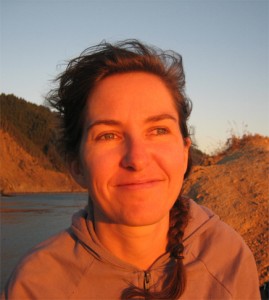Curent Location: Washington, D.C.
Current Gig: Project Editor for “What Went Wrong: The Betrayal of the American Dream,” at the Investigative Reporting Workshop
Member Since: September 2010
Six-word memoir: Never for money, always for love
Favorite Tech Tool: Twitter + Instapaper are my power combo, especially when using Twitter on my phone.
Favorite fictional character: Lauren Olamina, “Parable of the Sower” (maybe not favorite in that I love her best, but I think about her a lot)
What happens during your average day?
I check email before I leave the house to make sure nothing’s going bananas. Then bike to work, to maintain my sanity. Once I get to the office, the texture of my day depends where I am with the stories I’m working on. I often have a month or more to work on a big story, so I might be doing a lot of reading, research, or digging for data. Or I might be working the phones, which mostly involves talking to people who are unemployed, or people among the working poor, or some other kind of insecure worker. If I’m lucky, I am sitting with lots of notes, index cards, stacks of paper covered in post-its, and wrestling all my research into a narrative. And mixed in with all of that, daily, I’m reading hyperlocal news sites, trolling for economic and financial news we can feature on our site, and I’m checking my 20 or so news alerts in Google Reader, and I’m scanning Twitter. And editing the copy coming in from freelancers, staff and interns.
Why did you choose to get involved with online media?
It sort of found me. I used to work in radio, and I taught radio journalism to young people and members of community organizations in New York. The stories were broadcast, of course, but we had to develop an online presence because radio can be so ephemeral. That led me into thinking about multi-platform content, and how to produce stories for more than one medium. Then as I shifted into investigative reporting, it was all online for me. I think that’s partly because I moved into text and out of radio at a time when online news is ascendant, but it’s also probably because the online news sites were hiring, taking chances on people without a lot of longform experience, and the newspapers were not as accessible. At least to me.
Why is investigative reporting vital to the future of media?
Investigative reporting brings truth to light. I think right now, there’s a lot of dirty dealings that need exposure, from corporate malfeasance to political shenanigans. There’s two tricky bits, though. One is that good investigative reporting, the kind that sticks in your craw, has a strong narrative and strong characters. It’s more than number crunching, more than a fancy widget or app that uses data to state a new fact. That fact can be incredibly interesting, but the narrative is what makes people care. I’m worried that a lot of money and energy is going into the tools, and not as much into the craft, not to sound like a prematurely-old fogey. The other tricky bit is who gets to tell the stories, and who they’re telling them about. All of news has problems with diversity, from racial to gender to geographic. Investigative news, I think can be particularly hard to break into for people outside of the elite. And while most every investigative reporter I’ve met wants to afflict the comfortable, diversity in the newsroom means your reporters hear about different problems, their sources are different, the tips and niggling little journalistic itches they need to scratch are different. For investigative reporting to really be essential to the future of media, the field really needs to work on bringing more different kinds of people into the investigative fold.
If you had a million dollars dedicated to improving media, you would …
… Start the pipeline of diversifying journalism way, way early, like grade school. I’d have programs like Radio Rootz, the youth radio teaching program I used to run, in dozens of middle schools, introducing young people from rural areas, communities of color, and poor communities to storytelling and journalism. Then I’d continue those programs in high schools, and support paid internships for college students to work in newsrooms. If I still had money left over, I’d support grant programs for these young journalists to experiment with how emerging and discarded technologies can be used to produce engaged, community-accountable journalism. The kids are alright, you know?


